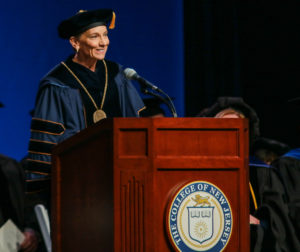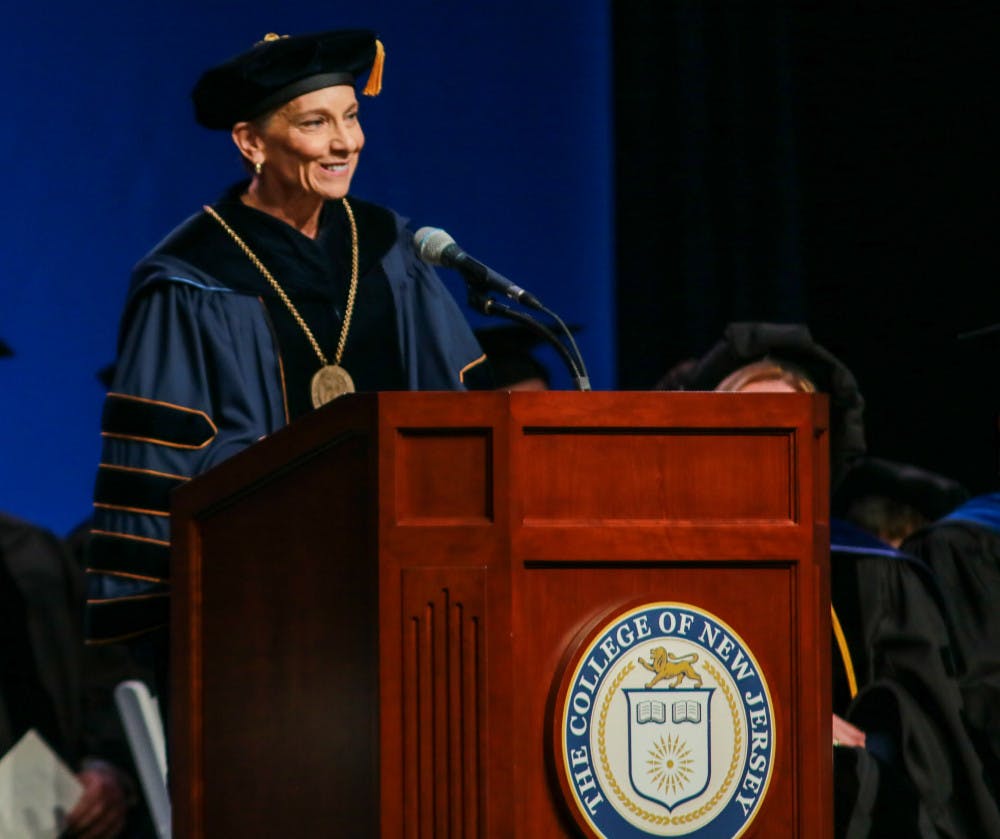By Alexandrea Carman
Correspondent
Every morning, Dr. Kathryn Foster eats the same fiber packed menu for breakfast –– a banana, Grape Nuts, All Bran, Quaker Oats and raisins drowned in almond milk, and then placed in the microwave oven to cook. But that is just about the only typical part of her day.

With over 35 years of experience in public higher education, Foster was unanimously voted the 16th President of the College by the Board of Trustees in July 2018 and is now at the end of her first year.
Foster’s favorite part of her job is the variety – every day is different, she explained during a 90-minute interview. On one night, she was going to a basketball game at the College, but on other days, she is working with alumni, talking with parents of students, or sitting in on a class.
“It’s like a little city – things are happening all of the time,” Foster said. “I exercise a lot of different muscles and I’m never bored.”
But even as a young girl, Foster was used to having hectic schedule.
Born and raised in Verona, New Jersey, Foster described her town of about 13,000 people as a place where education mattered, the scenery was pretty and there was a great county park. As a Verona native, she believes she fits the northern New Jersey stereotype of being a fast walker and talker.
She was also the middle child and believed there was a sense that her family had flair and did fun activities, such as renting a houseboat or going on midnight tours of Paterson, N.J. and Manhattan, more specifically the nightlife in Chinatown. During college, she and her mother also did a midnight tour of Baltimore, which featured a reading of Edgar Allan Poe’s “The Raven.”
“(My family and I) were close, happy and fun,” she said.
Growing up, Foster first thought she wanted to be a farmer, as she still loves to garden today. Then, she thought she wanted to be an actress because she loved being in front of a crowd and often performed in plays. She later wanted to be a cartographer because she loved maps, was the family navigator and enjoyed going places to learn more.
The College president was quick to say that her parents had the most influence in her life, saying she gets her analytical brain from her father, who was a mathematician, and her creative side from her mother, who was a theater actress.
Holding music and athletics close to her heart, Foster earned straight A’s and was a diligent rule follower, never willing to try things she did not do well. As a conservative, risk-averse child, she did not pursue a course or hobby such as a language or horseback riding, which she regrets.
“(I wish I had) done something and failed spectacularly,” Foster said.
In 1975, Foster studied geography at Johns Hopkins University in Maryland, where was surrounded by about 2,000 undergraduates. Exploring the neighborhoods around her, she fell in love with studying each street’s layout and wanted to be a city planner.
If she were not the College’s president, Foster said she would like to be an information designer, based on her ability to look at data and numbers and translate them into something visual, as she finds graphic designing centered around data points to be very interesting.
“I would need more computer and graphic design skills, but making Excel graphs and PowerPoint slides –– I can lose myself in it,” Foster said. “When I see data, I like to figure out how to tell a story. My mind would go visual immediately, and the creative and logical parts of my mind would both be put to use if I did this for a living.”
In addition to her dedication to learning, Foster was a runner for nearly 35 years and once participated in a competition in California along a course lined with redwood trees. She recalled running as being a stress reliever that taught her how to find an emotional, mental and physical balance.
“(Students must find ways to ensure they are exercising self-care) in ways that are responsible and will serve you well for your whole life,” Foster said. “I didn’t have enough (self-care). I’m not married and have no children, so it’s easy for me to keep working. I want to be a better role model, and I love the many engagement opportunities around campus.”
While she said her strengths include having high energy, being a hard worker and having the ability to see images and have perspective, the College president also shared her weaknesses.
“I’ve had to fight against my strong critical judgmental inclination my whole life,” she said. “I might misread people and it is a weakness as a leader and human being.”
Foster noted an recent example in giving remarks at her inauguration.
“...I cannot help but think about ways I could have done (the remarks) better,” she said. “As for others, it's simply a human matter of thinking, erroneously, that I understand where a person is coming from only to learn after closer listening and experience that I was wrong. It is that tendency I fight, although fortunately I have relaxed considerably over life.”
An experience that Foster said shaped her was volunteering in the Peace Corps in Swaziland, now called Eswatini, a small country in Africa about the size of New Jersey. As a young, white woman, she was often looked down upon in the very patriarchal society since the Swazi people honored elder, black men.
“This experience was profoundly formative in a positive way,” she said. “Reversing white privilege and realizing what it feels like to be a minority made me a better teacher, friend and administrator. I think I have a greater awareness and I’m grateful for the experience to know what it feels like. It has been a lifelong reflection.”
Foster noted that another life-changing experience was when she donated her kidney to a sick friend in need in 2009.
She reminisced about the experience, explaining “how fulfilling, medically fascinating and emotionally satisfying it is to help someone at the deepest level and offering them a chance to survive.”
Foster’s diverse background and commitment as the College’s president have inspired several members of the campus community, including Assistant to the Chief of Staff Cherese Rucker and former College President Barbara Gitenstein.
“Dr. Foster is like a breath of fresh air for me,” said Rucker. “She is caring, enthusiastic, committed and passionate about TCNJ and its faculty, staff and students, as am I. She is also very intelligent and takes the necessary time and compassion to handle each situation, no matter the context. She really cares about TCNJ and I believe her dedication is evident in her words and actions.”
The College screened hundreds of applicants during a rigorous search for a candidate to replace Gitenstein, who said she felt Foster had done well with taking her advice upon becoming the new president.
“My advice to President Foster when she first was named president at TCNJ was to listen to the community,” Gitenstein said. “Surely, there are times when a senior executive needs to take a stance that is not popular, but I feel that the TCNJ community is a wise, thoughtful and caring community and usually commits itself to the right direction. From what I can tell, observing from afar, Dr. Foster has taken my advice to heart.”







